Fighting and disagreeing about things is a natural part of a marriage. Who’s doing the dishes, who’s picking the kids up from school, what to eat for dinner – all of these can trigger arguments between couples. Pets can also cause arguments. In fact, research shows that dogs, in particular, cause three family arguments in a week.
This couple’s argument was especially heartbreaking. For several years, the husband thought his beloved dog ran away. Then he found out his wife and her father actually took his pet to the pound. Feeling incredibly hurt and betrayed, the man asked whether threatening separation over the incident was too much.
To learn more about families and pet ownership, Bored Panda reached out to the UK-based Clinical Animal Behaviorist Karen Wild. She’s a registered dog trainer and author of five books on dog and cat behavior, including Being A Dog. Karen kindly agreed to tell us more about assessing the dangers a dog might pose to a new baby and what families should consider before getting a dog.
Many dog owners love their pets like family members and mourn their loss when they run away
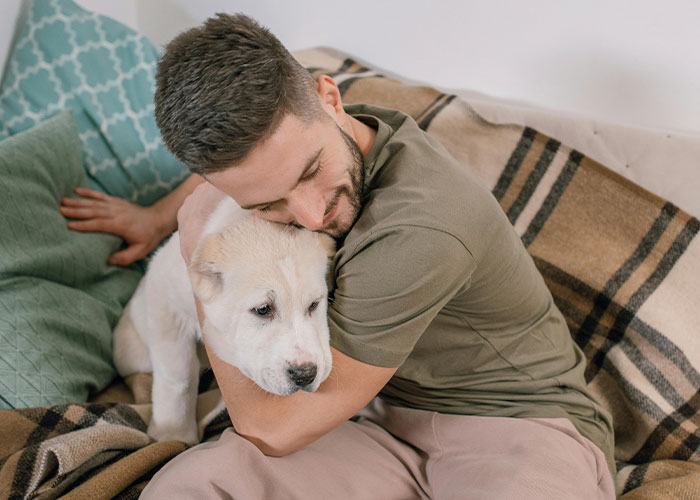
Image credits: Alena Darmel / pexels (not the actual photo)
This husband found out his dog didn’t actually run away but was taken to the pound by his wife

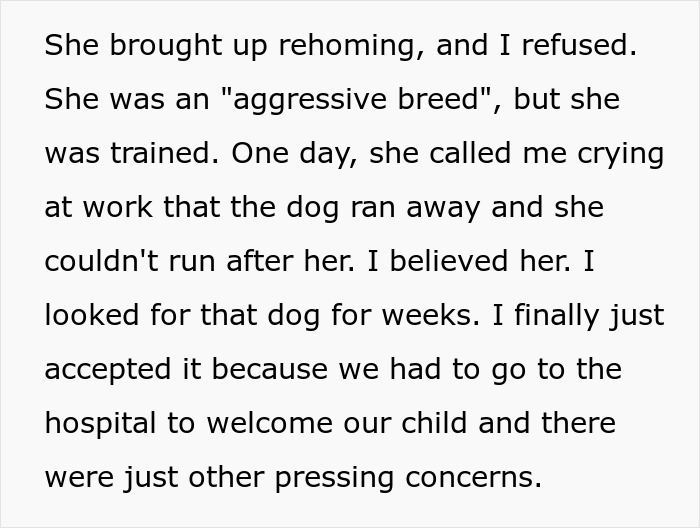

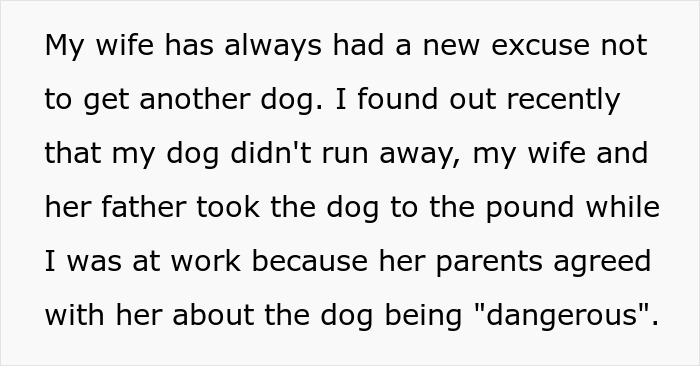

Image credits: Mia X / pexels (not the actual photo)
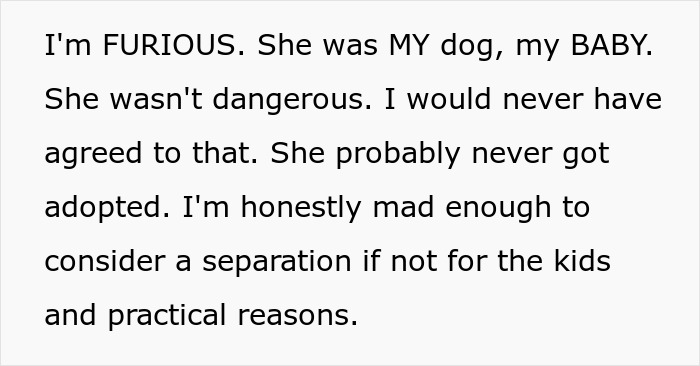

Image credits: Anonymous
The husband gave more details about his circumstances in the comments

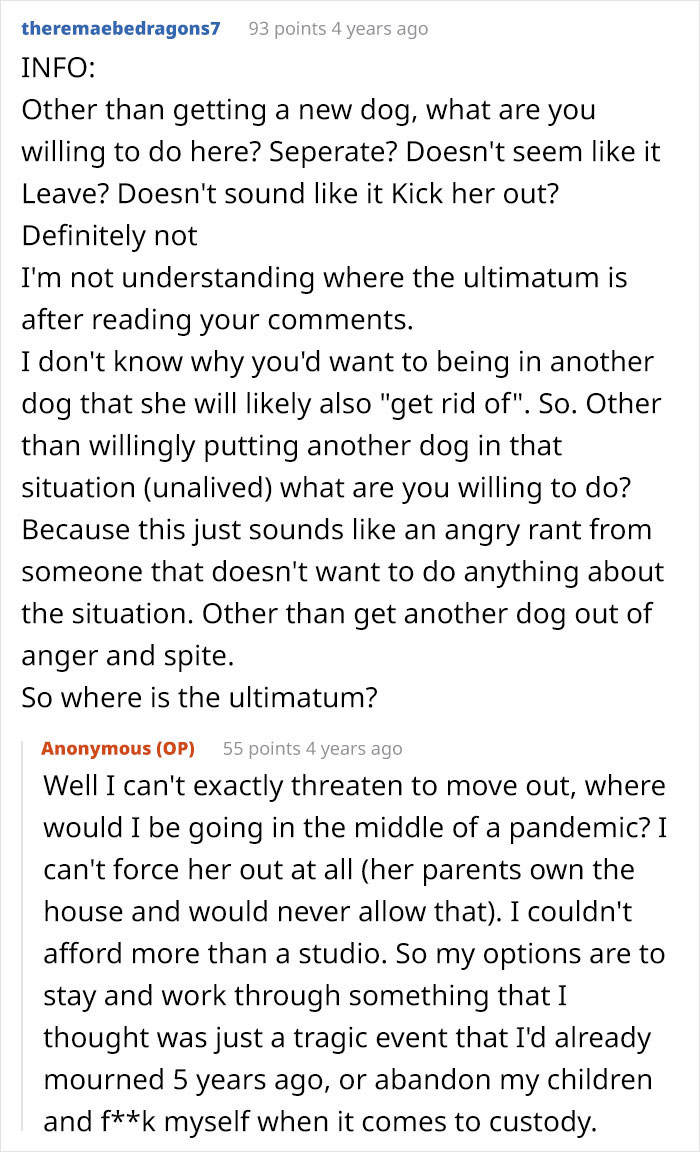
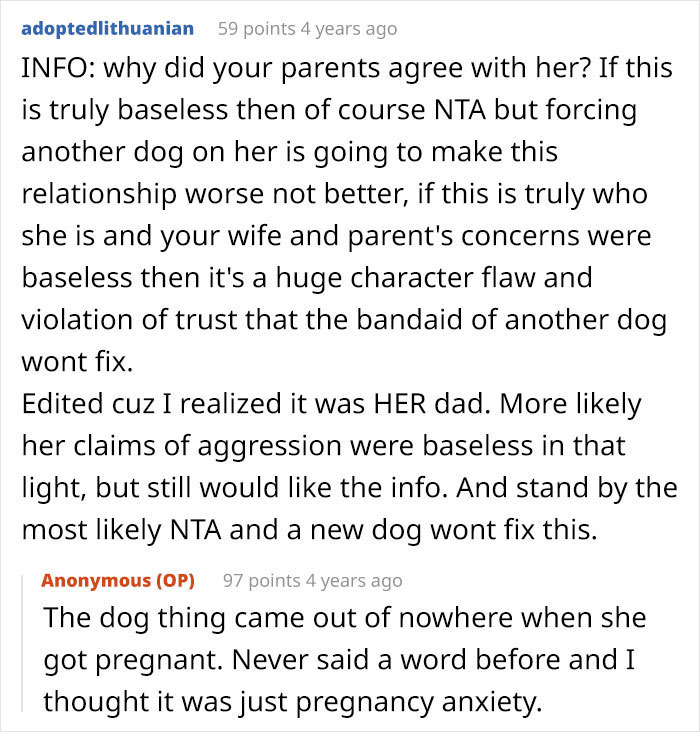

An animal behaviorist says that the fear of the dog not getting along with a newborn is not completely unfounded
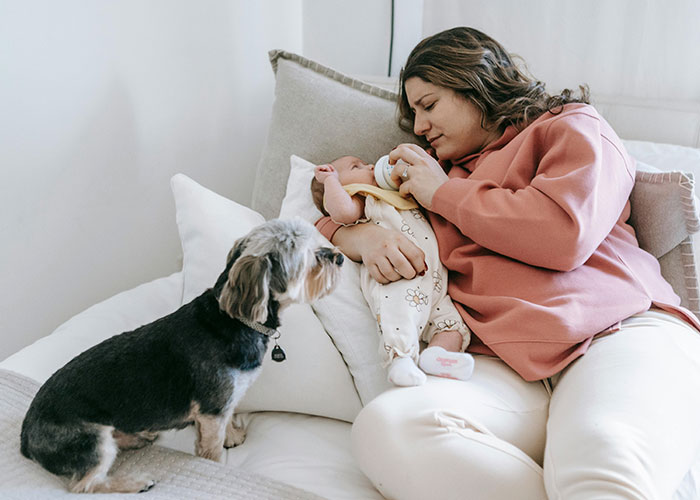
Image credits: Sarah Chai / pexels (not the actual photo)
Since the wife in the story seemed to worry about her newborn’s safety because of the dog, we asked an animal behaviorist, Karen Wild, how new parents should approach this issue. She says that it’s best to leave any assessment of possible danger to a professional.
“A clinical animal behaviorist is trained to assess potential risks, ranging from how likely the dog is to show impulse control around a wide range of things, including children, but also whether or not the dogs have been well trained using positive reward-based methods.”
“All dogs react differently to temptations, stressful situations, and changes to their lives. It is reasonable to expect a new baby to change the dog’s routine, so preparing for other help with the dog [and] keeping the dog’s life as similar as possible to before will help the dog cope and feel more secure and calmer.”
“It is a complex area, and such a risk assessment, especially to do with baby and child safety, is something that should only be entrusted to a registered professional,” Wild emphasizes. “Every dog is an individual, and it is common for owners whose dogs have bitten [them] to be very surprised that it has happened.”
Dog ownership should be a long-term commitment
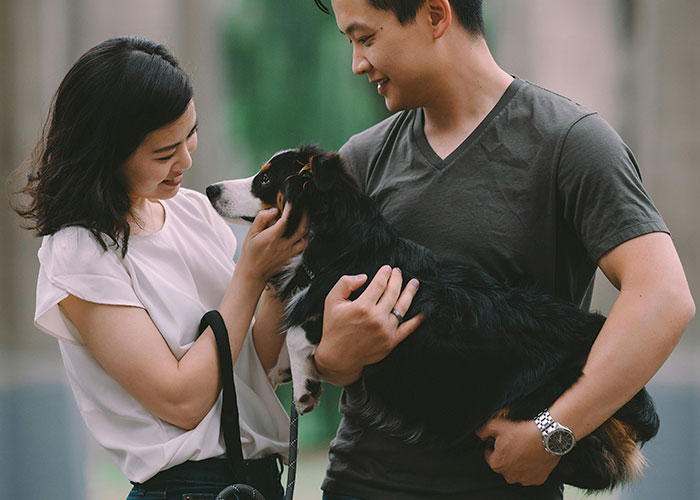
Image credits: Maria Orlova / pexels (not the actual photo)
“A dog will be around for a very long time,” Karen Wild says. “And even the most well-raised dogs can have problems throughout their lives. I see many families with problems with their dogs, where the problems were simply making the wrong choice for that family.” That’s why families should consider certain things before getting a dog.
Karen says that people often choose a dog that doesn’t align with their lifestyle. “Too big, too active, not enough time, expecting the dog to not have needs of their own, etc. Dogs need considerable amounts of time and money, and [they] deserve to be cared for as fully as possible,” she says.
“I would always insure a dog and be ready for that cost because medical care is expensive. The biggest consideration is [to] not choose on breed alone, and never on fashion. This does not give you any idea about their temperament. Many fashionable breeds have serious health issues and will not have the lovely happy life you’d like.”
“Puppy farm sellers are extremely devious and will conceal the puppy’s early upbringing, so read up carefully on this,” Karen also adds. “Always meet the mother dog, [and] make sure she is the real mother. Meet the father if you can and as many of the litter and other family dogs as possible. Ask an expert for help; we are trained to support you!”
Some people might be against pets because of the cost, lifestyle changes, and the mess they make
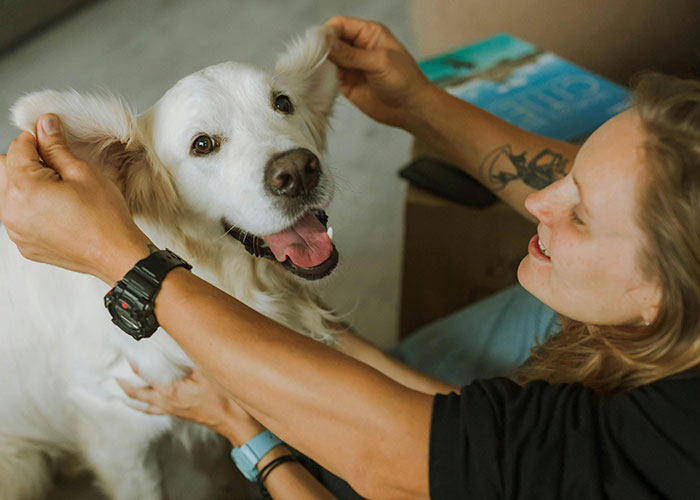
Image credits: Anastasia Shuraeva / pexels (not the actual photo)
Married people make decisions together. Going behind your partner’s back and doing something as serious as getting rid of their long-term pet is nothing short of cruel. However, one partner not wanting a pet is not that strange. The reasons for that can be many, from allergies and fear to simply disliking cats, dogs, or other types of pets.
But there’s also the financial issue. In order to take good care of a dog, you need to spend some money. There’s food, veterinary care, bed, toys, treats, leashes — the costs can add up to a considerable sum pretty quickly. The Rover estimates that the annual cost of having a dog is between $1,000–$5,225.
Perhaps the biggest difference between couples who own a dog and those who don’t is their lifestyles. When you have a dog and are going on a trip, you either have to take them with you or leave them with a sitter. It’s both mental labor and additional costs. Nowadays, there are also daycares, dog walkers, and pet hotels for those who wish to have some time off without their pets.
Other people don’t like the messes pets can make. Most times, owning a pet means your home is going to be covered in hair. Those who live in less sunny climates also have to deal with their dog bringing in dirt from outside constantly. If the pup is still small, there’s a whole other can of worms with potty training, which comes with its particular sights and smells.
Animal Behaviorist Karen B. London, Ph.D., also writes about the emotional aspect of why some people don’t want to get a dog. They simply fear they will fail the pet as an owner. “Having a dog is a lot of responsibility, and that can make many people nervous, especially if they have never been a pet parent before,” she claims.
Some partners can warm up to the idea of a pet they don’t want, but it’s not for everyone
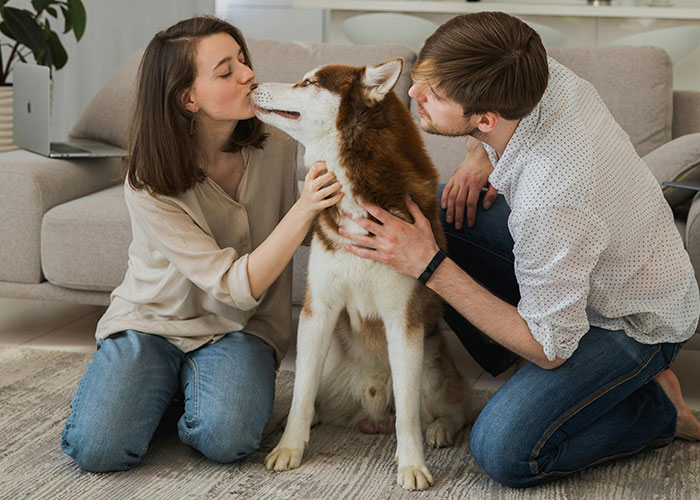
Image credits: KATRIN BOLOVTSOVA / pexels (not the actual photo)
When one partner is against having a dog but the other wants it badly, it might seem that there’s no way out. However, it’s possible to resolve the situation without resorting to ultimatums and shouting, “It’s either the dog or me!”
Karen B. London, for example, recommends couples to do a trial run. That means either fostering a dog for a few weeks or just looking after a friend’s pet for a few days. Practice makes perfect, after all, and it might turn out that the partner who was so against the pup is actually quite good at pet care and/or training.
Clinical psychologist and author of When Pets Come Between Partners: How to Keep Love — and Romance — in the Human/Animal Kingdom of Your Home, Dr. Joel Gavriele-Gold, Ph.D., told the AKC something similar. “For a lot of people, what works is just trying it. It often turns out better than expected, and the dog ends up adored by the one who didn’t want it.”
If the dog is already living with the family but one partner seems to be against it, experts say that it’s important to find out why they have this aversion. Identifying the problem might lead to better conflict resolution. If it’s about the mess, the walking, or the feeding, the partner with the pet should be taking responsibility.
“If it’s your pet, and you say, ‘I see that shedding bothers you, so I’m going to do the cleaning,’ that’s respecting the other. If you’re saying, ‘If it bothers you so much, then you clean it,’ I think that’s sending a bigger message,” Marriage and Family Therapist Catherine Hastings, Ph.D., says.
If the conflict is caused by a dog’s behavioral issues, experts advise enrolling in training classes. Other couples choose to wear out their pets in daycare so they’re not as unruly at home. At the end of the day, the couple should ask themselves whether this issue is bigger than them. For some, it might be a dealbreaker. For others, Hastings says, it might bring them closer together.
Some people blamed the wife for secretly getting rid of the dog

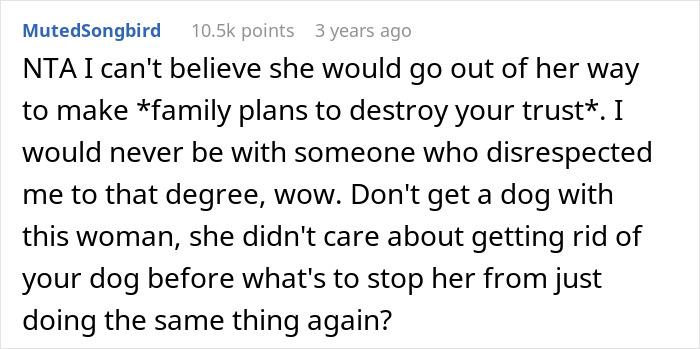

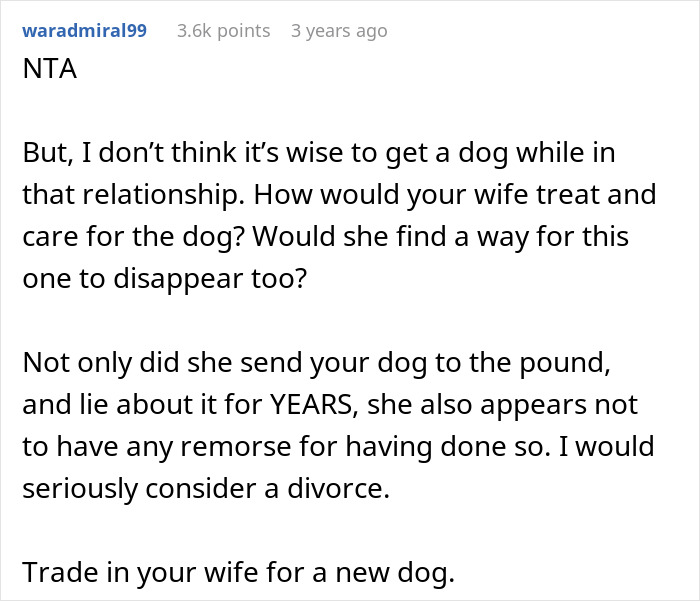

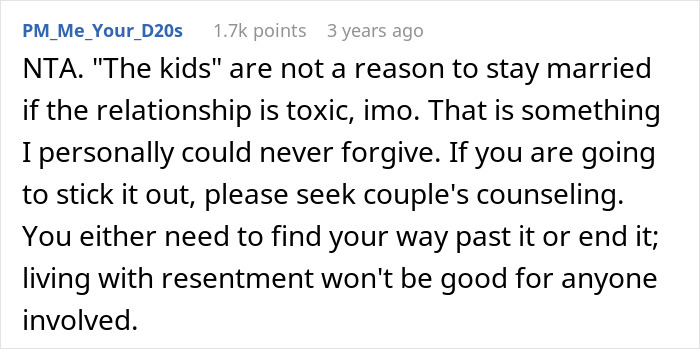

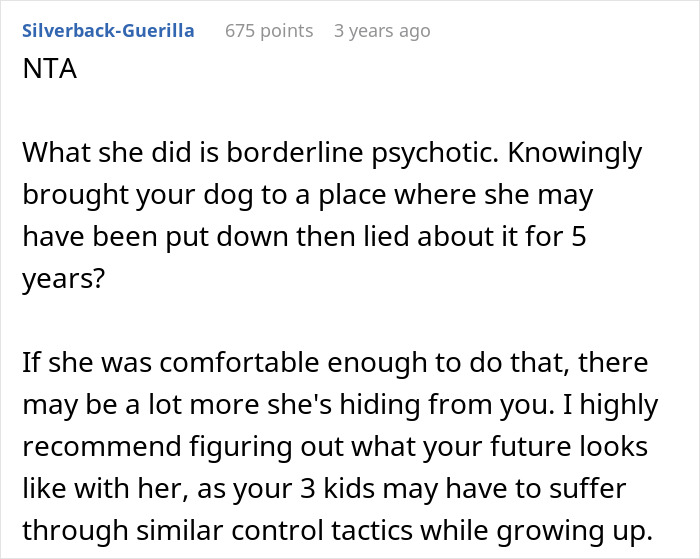

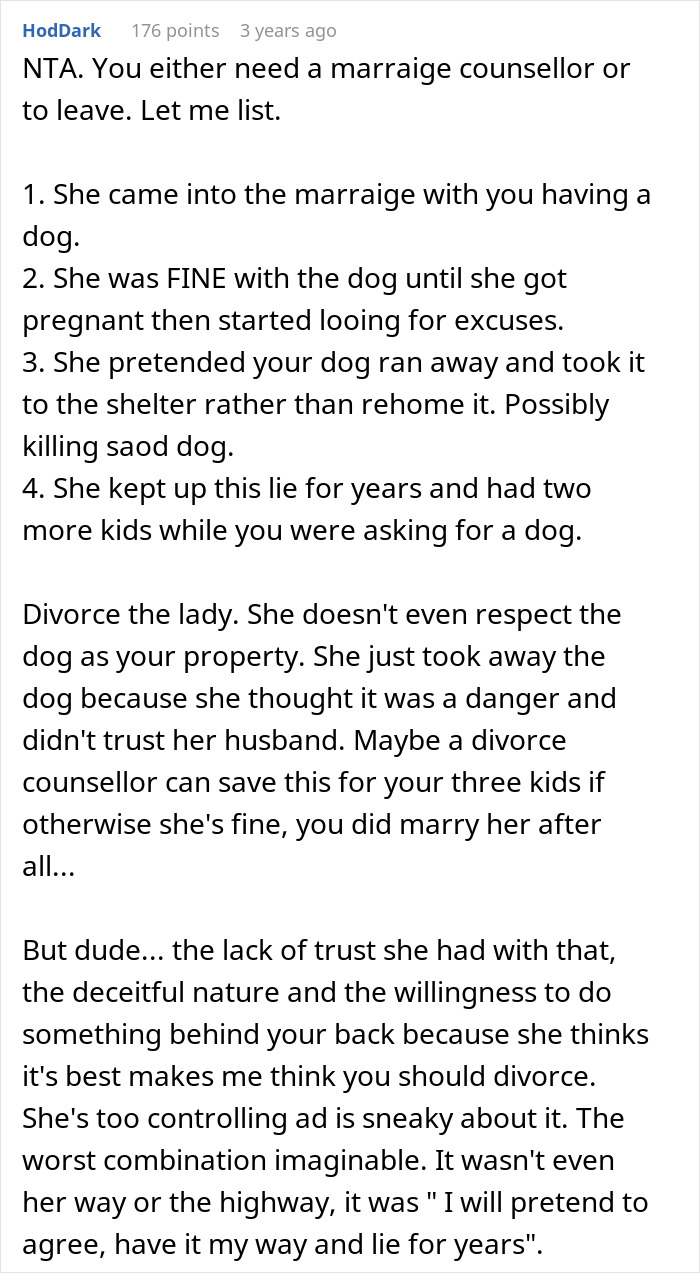

Others thought everyone in this situation sucked



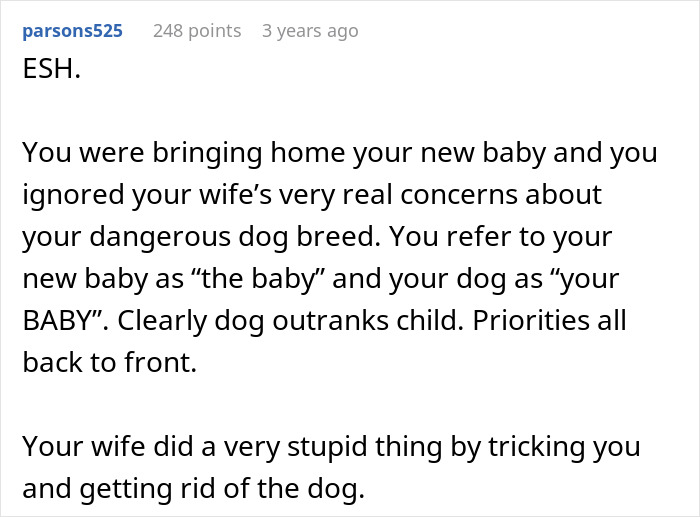
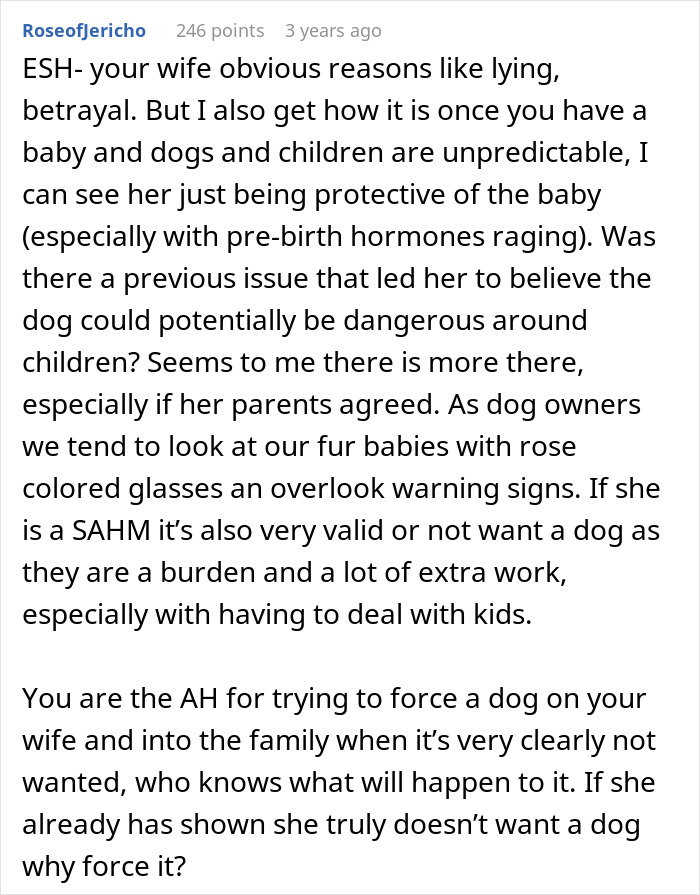
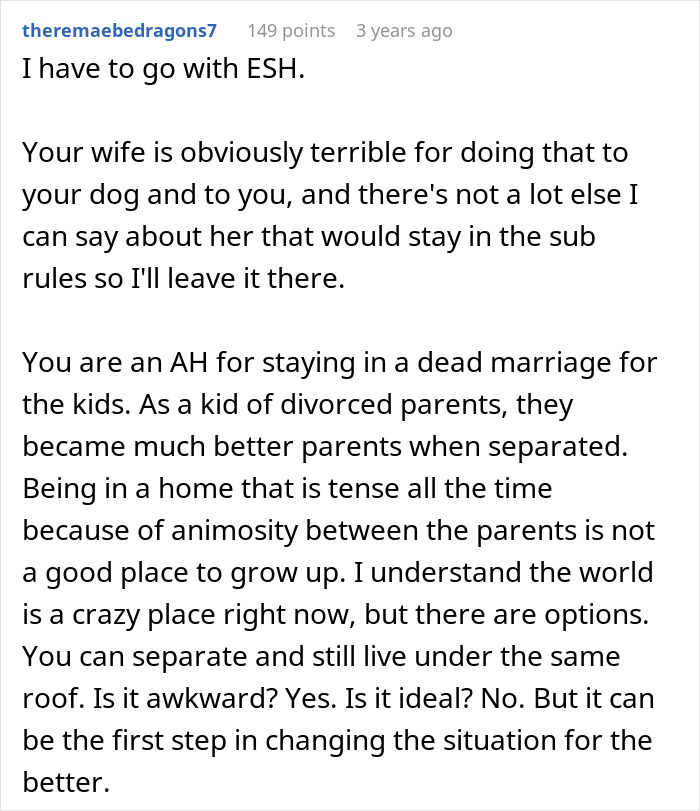
Others deemed the husband to be the guilty one










